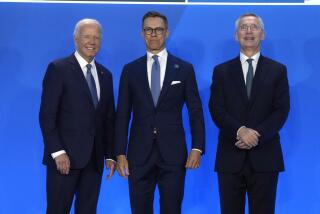Big Steel Exporters Agree to U.S. Quotas : Trade: Nations agree to end subsidies and keep markets open to U.S. steel. Some fear domestic firms will lose competitive edge.
WASHINGTON — Major steel-producing nations have agreed to abide by new restrictions on exports to the United States and to end subsidies on steel production, U.S. Trade Representative Carla Anderson Hills said today.
Hills said the program extends existing voluntary quotas for 2 1/2 years and commits the nations to end subsidies and to keep their home markets open to foreign steel.
“The bilateral agreements restricting trade-distorting practices are the cornerstone of the President’s program to seek a consensus to address the causes rather than the symptoms affecting world trade in steel,” she said.
The program, announced by President Bush on July 25, is designed to shield the U.S. steel industry from cheap foreign imports while it modernizes to meet overseas competition.
Opponents of the program say that the American steel industry is profitable and that continued curbs on foreign steel would hurt the competitiveness of domestic steel users, who are handicapped in their own export drives by paying higher prices for steel.
Foreign producers took about 30% of the U.S. steel market five years ago. Last year the figure was about 20%.
The new quota program limits imports to 19.1% of the U.S. market in the first year and 20.1% in the second, including incentives to nations that end their subsidies.
Voluntary restraint agreements were reached with the 12 member nations of the European Community, Australia, Austria, Brazil, Czechoslovakia, East Germany, Finland, Hungary, Japan, South Korea, Mexico, China, Poland, Romania, Trinidad and Tobago, Venezuela and Yugoslavia.
Agreements to end many subsidies immediately and others in phases were reached with the EC, Japan, South Korea, Brazil, Mexico, Australia, and Trinidad and Tobago, countries that account for 90% of the imports covered by the so-called voluntary restraints.
Hills also said that negotiations to end subsidies and keep domestic markets open were under way with several other countries, including Austria, Finland and Yugoslavia.
The agreements mandate binding arbitration to settle complaints, she said.
All the signers, Hills said, pledged to negotiate for rules to bar subsidies and further reduce tariffs under the General Agreement on Tariffs and Trade.
S. Linn Williams, deputy trade representative, said the Administration had no plans to extend the quotas again when they expire in 1992. He told reporters that by then a global steel agreement is expected to be in place.
Williams said foreign nations would realize if they increased exports to the United States when the pact expired that pressure would swell for renewed quotas, particularly because 1992 is an election year.
He said the U.S. steel industry is free to file a complaint while the agreement is in effect but that any nation named in a complaint likely would drop out of the pact.
“It’s a kind of a mutually assured destruction between the industry and the exporting countries,” Williams said.
More to Read
Sign up for Essential California
The most important California stories and recommendations in your inbox every morning.
You may occasionally receive promotional content from the Los Angeles Times.










